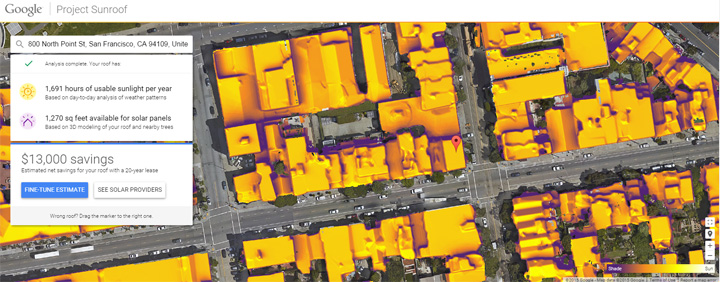TORONTO – More and more people are exploring the possibility of investing in solar energy. But the initial cost of installing solar panels on your home can be a big turn off – especially if you don’t know what your return on investment might be.

Google has launched a new project aimed at helping home and business owners figure out whether or not they should invest in solar energy by answering two of the most commonly Googled questions: Does my roof get enough sun, and what might my estimated energy savings be over time?
Dubbed “Project Sunroof,” the tool uses Google Maps to figure out how much sun exposure your property gets and factors in things like the angle of the roof and obstructions like trees and chimneys.
The tool then estimates how many panels you would need and how much you could save on your electric bill, including any solar incentives offered in your area.
You can even explore buying versus leasing solar panels and see how it might affect your budget over time.
“So there’s this giant power plant in the sky and its creating free energy for anyone to catch,” Google explains in a video unveiling the project. “But most people aren’t catching it – because, even though it would save them money on their electric bills, getting started can be pretty frustrating.”
Many Canadian homeowners have turned to solar power to cut costs and become more environmentally friendly.
READ MORE: Solar savvy residents advocate for renewable energy
According to solar contractor James Dennis, with Sound Solar Systems, cost is one of the reasons people don’t buy in. However, he said people need to think of solar panels as an investment in the future, like buying a house instead of renting.
“It’s getting over the fact of paying for your power up front,” said Dennis. “Most people are spending from $15,000 and $30,000 to do anywhere from half to 100 per cent of their power.”
Google isn’t the first tech company to recognize the growing interest in renewable energy.
In May, electric car manufacturer Tesla unveiled its Powerwall home battery, which can be used as a backup battery for consumers’ homes. Powerwall will allow consumers to store renewable energy and access it as needed. Though it won’t fully power homes, the device could be used as a backup power source, or to charge things like electric cars.
Google’s Project Sunroof is currently only available in the San Fransisco Bay area, Fresno, California, and the greater Boston area. However, the tech company said it plans to expand the project across the U.S. and eventually other regions, if it proves popular.
- Budget 2024 failed to spark ‘political reboot’ for Liberals, polling suggests
- Train goes up in flames while rolling through London, Ont. Here’s what we know
- Peel police chief met Sri Lankan officer a court says ‘participated’ in torture
- Wrong remains sent to ‘exhausted’ Canadian family after death on Cuba vacation




Comments